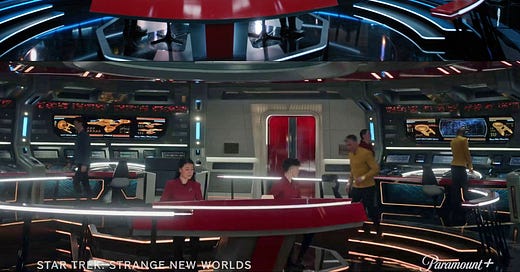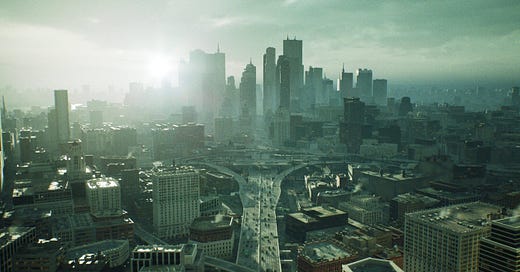SF/F Review – Planetfall
Synopsis: In a post-scarcity utopia, a woman struggles with decades of guilt by running away from everything. Book Review: The majority of this book is kinda mediocre. It can be hard to create meaningful conflict in a utopia, because what is there to fight about? This leaves most things feeling very low-stakes. The author also has an immensely irritating way of constantly bringing up this Dark Act in the protagonist's past, and then pointedly not telling us anything about it. Every few dozen pages it's "but I couldn't do anything about it, because of the Dark Act in my past," which is exactly how to NOT do this sort of thing. You're supposed to hint about it, and drop clues in the protagonists actions and speech patterns. Chasm City did this thing wonderfully. Planetfall hacks at it clumsily. Plus from page 1 we all want to scream at the book "YES, WE KNOW SHE KILLED A BUNCH OF PEOPLE AND THEN COVERED IT UP FOR THE GOOD OF THE COLONY, GET ON WITH IT ALREADY!" The book does do some cool things with mental illness, I think. The revelation of the protagonists compulsive hoarding, and how much it rules her life, is interesting. Our book clubs pysch major didn't like it, said it was a superficial handling, but I found it one of the neat things here. Unfortunately that's not really enough to hang a whole book on. The colonists are remarkably incurious for a religious cult living in the literal shadow of their giant god, but I dunno, I've seen enough crazy shit in real-life religions to let that go. Their attitude of "eh, whatever" is a good summary of how I felt reading this book. It was easy enough to read and it didn't hurt or anything, but I wouldn't write home about it. Until the end. Oh dear lord. There are three different climaxes. The only one that is related to the rest of the novel, thematically, is the rest of the colony discovering our protagonist is a hoarder and tearing apart her house in schadenfreude. It fits the story, but it's not particularly well done. A good handling could make this sort of thing feel like the end of the world. Instead it was just sad. But that climax is quickly abandoned for RANDOM ATTACK BY SAVAGES! Which is completely unforeshadowned and basically bullshit because it comes out of nowhere. Also, we're supposed to believe seven savages with knives are able to overwhelm a modern colony of 1,000 space-faring peoples? And where they hell did the savages get explosives? After a quick raid they kill a dozen people and kidnap ten more and flee back into the wilderness, which makes me wonder - what the hell was their end-game? They aren't worried about the fact that they pissed off 975 people with the ability to print guns and vehicles on demand, with orbital cameras? (Yes, the savages know this, one lived with the colonists for some time!) But without a doubt the worst, most infuriating thing is the third climax. Protagonist enters god/god's building and walks through what is basically the worlds easiest puzzle game. It's laid out exactly like a video game, except the puzzles are aimed at the 5-8 year old demographic. Not ONE other colonist in the past 20 years bothered to sneak into this building to try this? Our protagonist makes it to the end of the video game, discovers that progenitor aliens seeded the galaxy with humanoid life, and basically kills herself. I mean, technically she transcends physical existence and is now at peace and one with everything, but that's functionally indistinguishable from suicide. And this is while A. The rest of her colony is being ravaged by savages with knives, and B. there is still a religious taboo against entering god's building, so this secret will die with her. In theory I guess anyone else could walk through the puzzle rooms as easily as she did, but that is some serious bullshit. Your people need you, you have the secret of god or whatever, and you're just gonna say "eh, fuck those losers" and kill yourself? SCREW YOU. Not Recommended. Personal Musing: It's books like this that make me wonder why I bother with reading unknown authors. I feel like I wasted many hours of my life on this, and I look back on Obelisk Gate and think "I should just stick with known quantities. If I already know someone is good, or a book is getting a lot of buzz, I read that, and don't waste my time on the rest." It's seriously disheartening to run into a climax that makes me want to hurl a book across the room. But then I think... if it wasn't for picking up random books, I would've never read Perdido Street Station. OK, that's not entirely true, I would've heard about how great it is eventually. But it took a bunch of people willing to pick up a random first book by an unknown author to get to that point. And more to the point - I actually never would have read Vellum, as most people don't like it and I've never heard about from anyone but myself. And it's the best thing I've ever read. So I guess I'm willing to take shots in the dark from time to time, for the possibility of landing a hit like that. At least I get a blog post out of it! :) Book Club Review: There are a few interesting things to talk about. It seems the author is asserting that creating a post-scarcity utopia on Earth is impossible, due to the legacy issues we have, and our population load. But setting up a new colony on an untouched planet with a thousand people and tech only a few decades further along than our own could be viable utopia. That is both hopeful (we're so close!) and really depressing (we can only do it if almost everyone else is gone!). The juxtaposition of the post-scarcity society and the literally hunter-gathering savage society is fascinating and heartbreaking. It really hit home for me when the savage boy asks "Do you live here because that's where the food is?" Ouch. That being said, all this was overshadowed by the truly awful ending, and the way nothing really held together. Not Recommended.









